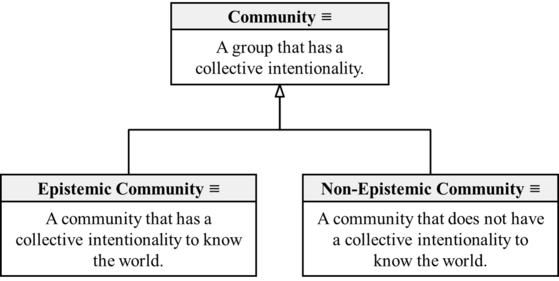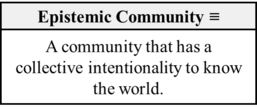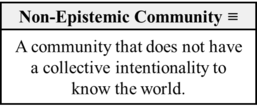Difference between revisions of "Modification:Sciento-2017-0014"
Paul Patton (talk | contribs) |
|||
| Line 9: | Line 9: | ||
|Authors List=Nicholas Overgaard, | |Authors List=Nicholas Overgaard, | ||
|Resource=Overgaard (2017) | |Resource=Overgaard (2017) | ||
| − | |Preamble= | + | |Preamble=There seems to be a clear distinction between ''epistemic communities'', that have a collective intentionality to know the world, and ''non-epistemic communities'', that do not have that intentionality. Examples of the latter category include political, economic, or familial communities. For instance, as a [[Community|community]] an orchestra has a collective intentionality to play a piece of music. At the same time, an orchestra does not have a collective intentionality to know the world. In fact, this community can accept many theories (e.g. about performance technique or instrument maintenance) that may help them accomplish the collective goal of playing a piece of music. Yet, knowing the world is not part of the collective intentionality of this community. The same goes for political parties. While a political party can have its own mosaic of theories (e.g. concerning effective governance, or the ideals of society), the party lacks a collective intentionality to know the world and, thus, it is not an epistemic community. The distinction between the two subtypes of community is, therefore, important to accept. |
|Modification=Accept the following taxonomy for two subtypes of community: | |Modification=Accept the following taxonomy for two subtypes of community: | ||
| Line 15: | Line 15: | ||
|To Accept=Epistemic Community (Overgaard-2017), Non-Epistemic Community (Overgaard-2017), | |To Accept=Epistemic Community (Overgaard-2017), Non-Epistemic Community (Overgaard-2017), | ||
|Parent Modifications=Modification:Sciento-2017-0012, | |Parent Modifications=Modification:Sciento-2017-0012, | ||
| + | |Automatic=No | ||
|Verdict=Open | |Verdict=Open | ||
|Date Assessed Approximate=No | |Date Assessed Approximate=No | ||
}} | }} | ||
Latest revision as of 18:42, 10 February 2020
Provided that the definition of community is accepted, accept new definitions of epistemic community and non-epistemic community as sub-types of community.
The modification was suggested to Scientonomy community by Nicholas Overgaard on 19 May 2017.1 This modification presupposes the acceptance of Sciento-2017-0012. The modification is currently being evaluated; a verdict is pending.
Preamble
There seems to be a clear distinction between epistemic communities, that have a collective intentionality to know the world, and non-epistemic communities, that do not have that intentionality. Examples of the latter category include political, economic, or familial communities. For instance, as a community an orchestra has a collective intentionality to play a piece of music. At the same time, an orchestra does not have a collective intentionality to know the world. In fact, this community can accept many theories (e.g. about performance technique or instrument maintenance) that may help them accomplish the collective goal of playing a piece of music. Yet, knowing the world is not part of the collective intentionality of this community. The same goes for political parties. While a political party can have its own mosaic of theories (e.g. concerning effective governance, or the ideals of society), the party lacks a collective intentionality to know the world and, thus, it is not an epistemic community. The distinction between the two subtypes of community is, therefore, important to accept.
Modification
Accept the following taxonomy for two subtypes of community:
Theories To Accept
- Epistemic Community (Overgaard-2017): A community that has a collective intentionality to know the world.
- Non-Epistemic Community (Overgaard-2017): A community that does not have a collective intentionality to know the world.
Questions Answered
This modification attempts to answer the following question(s):
- Epistemic Community: What is epistemic community? How should it be defined? I.e. how is it different from non-epistemic community?
- Non-Epistemic Community: What is non-epistemic community? How should it be defined? I.e. how can it be differentiated from epistemic community?
Verdict
The modification is currently being evaluated; a verdict is pending.
Click on the Discussion tab for comments.
References
- ^ Overgaard, Nicholas. (2017) A Taxonomy for the Social Agents of Scientific Change. Scientonomy 1, 55-62. Retrieved from https://www.scientojournal.com/index.php/scientonomy/article/view/28234.


